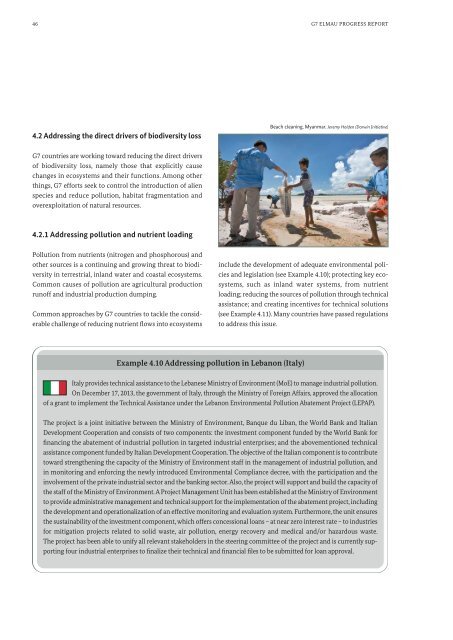G7-Elmau-Progress-Report-2015-Biodiversity-A-vital-foundation-for-sustainable-development
G7-Elmau-Progress-Report-2015-Biodiversity-A-vital-foundation-for-sustainable-development
G7-Elmau-Progress-Report-2015-Biodiversity-A-vital-foundation-for-sustainable-development
You also want an ePaper? Increase the reach of your titles
YUMPU automatically turns print PDFs into web optimized ePapers that Google loves.
46 <strong>G7</strong> ELMAU PROGRESS REPORT4.2 Addressing the direct drivers of biodiversity lossBeach cleaning. Myanmar. Jeremy Holden (Darwin Initiative)<strong>G7</strong> countries are working toward reducing the direct driversof biodiversity loss, namely those that explicitly causechanges in ecosystems and their functions. Among otherthings, <strong>G7</strong> ef<strong>for</strong>ts seek to control the introduction of alienspecies and reduce pollution, habitat fragmentation andoverexploitation of natural resources.4.2.1 Addressing pollution and nutrient loadingPollution from nutrients (nitrogen and phosphorous) andother sources is a continuing and growing threat to biodiversityin terrestrial, inland water and coastal ecosystems.Common causes of pollution are agricultural productionrunoff and industrial production dumping.Common approaches by <strong>G7</strong> countries to tackle the considerablechallenge of reducing nutrient flows into ecosystemsinclude the <strong>development</strong> of adequate environmental policiesand legislation (see Example 4.10); protecting key ecosystems,such as inland water systems, from nutrientloading; reducing the sources of pollution through technicalassistance; and creating incentives <strong>for</strong> technical solutions(see Example 4.11). Many countries have passed regulationsto address this issue.Example 4.10 Addressing pollution in Lebanon (Italy)Italy provides technical assistance to the Lebanese Ministry of Environment (MoE) to manage industrial pollution.On December 17, 2013, the government of Italy, through the Ministry of Foreign Affairs, approved the allocationof a grant to implement the Technical Assistance under the Lebanon Environmental Pollution Abatement Project (LEPAP).The project is a joint initiative between the Ministry of Environment, Banque du Liban, the World Bank and ItalianDevelopment Cooperation and consists of two components: the investment component funded by the World Bank <strong>for</strong>financing the abatement of industrial pollution in targeted industrial enterprises; and the abovementioned technicalassistance component funded by Italian Development Cooperation. The objective of the Italian component is to contributetoward strengthening the capacity of the Ministry of Environment staff in the management of industrial pollution, andin monitoring and en<strong>for</strong>cing the newly introduced Environmental Compliance decree, with the participation and theinvolvement of the private industrial sector and the banking sector. Also, the project will support and build the capacity ofthe staff of the Ministry of Environment. A Project Management Unit has been established at the Ministry of Environmentto provide administrative management and technical support <strong>for</strong> the implementation of the abatement project, includingthe <strong>development</strong> and operationalization of an effective monitoring and evaluation system. Furthermore, the unit ensuresthe sustainability of the investment component, which offers concessional loans – at near zero interest rate – to industries<strong>for</strong> mitigation projects related to solid waste, air pollution, energy recovery and medical and/or hazardous waste.The project has been able to unify all relevant stakeholders in the steering committee of the project and is currently supportingfour industrial enterprises to finalize their technical and financial files to be submitted <strong>for</strong> loan approval.


